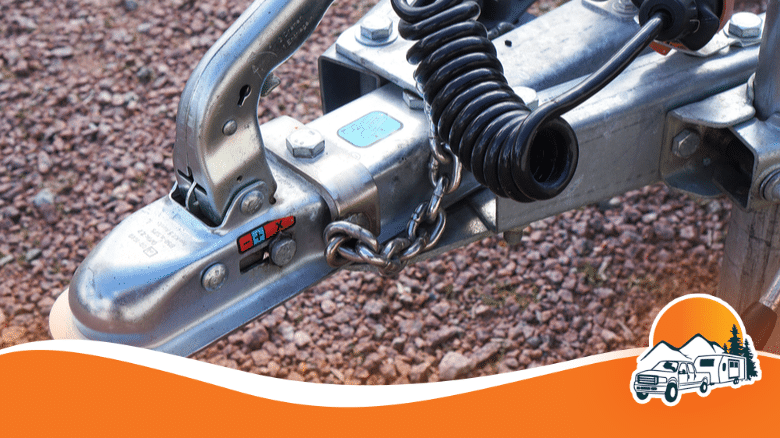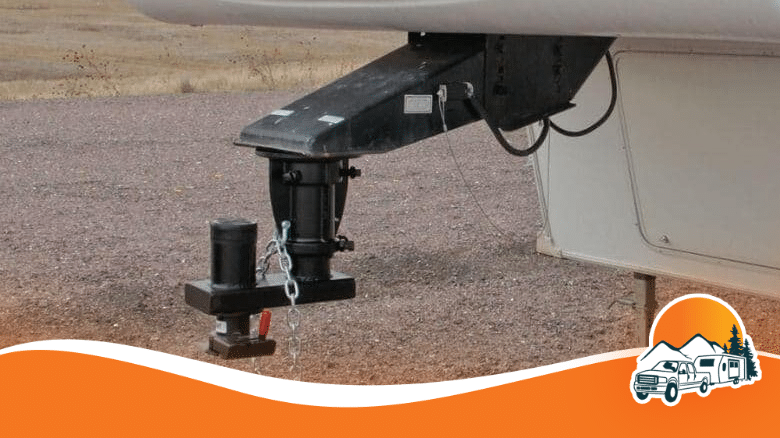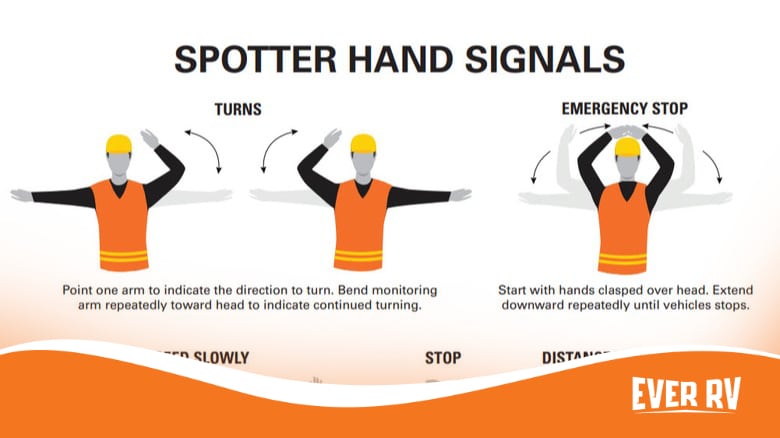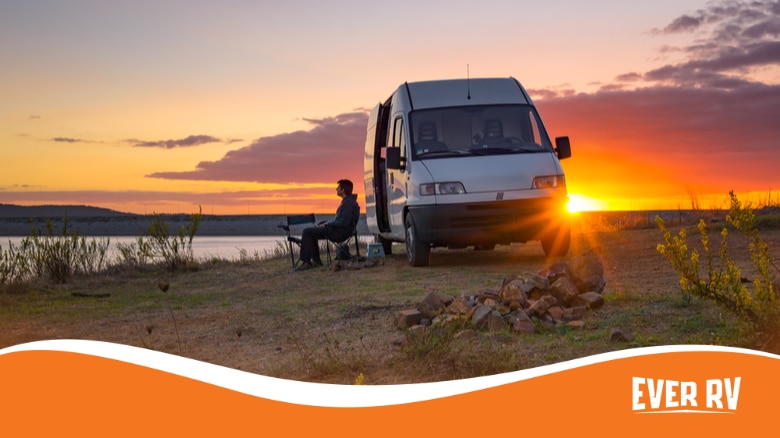An RV trailer hitch is essential to your RV travel trailer towing mechanism. Your camper will not move without a ball hitch, and you won’t be able to go on your next RV vacation. However, RV owners may feel confused when dealing with travel trailer ball hitches. Some of the questions that usually pop up include:

- Why does the RV travel ball hitch come in 4 different sizes?
- How do you pick the perfect size for your RV travel trailer?
- How can you be sure about using the ball hitches accurately?
We answer these questions, and many others, in our detailed guide on the most common travel trailer ball hitch sizes. Stay with us for more.
The Most Common Sizes for Ball Hitch
Ball hitches come in numerous shapes and sizes, but most travel trailer owners prefer 4 sizes.
The most popular trailer hitch ball size includes:
- 1-7/8-inch hitch size ball: The 1-7/8-inch hitch ball is used for towing lightweight travel trailers weighing under 3,600 lbs. Other smaller RV travel trailers can work perfectly with this size, but most trailers weigh above 3,600 lb. and will not work with this size.
- 2-inch hitch size ball: The 2-inch hitch ball is for towing medium-weight travel trailers. This hitch ball can tow travel trailers weighing around 12,500 lbs.
- 2-5/16-inch hitch size ball: These balls are meant for towing heavyweight travel trailers weighing 22,000 lbs. or more. These balls are durable and manage more weight than others. Their sturdy nature and additional durability make them the most common travel trailer ball size for all weight categories.
- 3-inch hitch size ball: The 3-inch balls are used for towing goosenecks. RV owners do not use the towing hitch ball for fifth wheels or travel trailers.
The 2-5/16-inch hitch ball is the preferred size for most RV travel trailers and trucks. The 2-inch hitch ball can also work well for some travel trailers but might be underpowered for heavier trailers. Just to clarify, the ball sizes are based on the radius of the circular ball. There are other metrics as well, including the circular shaft of the ball to use as a sizing guide.
Tips to Follow While Using Your Travel Trailer Hitch
Using an adjustable travel trailer hitch may seem confusing, but it can be made easier with the right tips and tricks. We have mentioned some suggestions below to maintain your hitch in good health and reduce complications.
Watch the Hitch Ball Weight Ratings
It is essential that you do not exceed the recommended weight for your towing trailer ball hitch. Your travel trailer ball hitch can only tolerate a limited amount of weight, so you shouldn’t go beyond the weight capacity of your ball hitch. Exceeding the weight limit by even a few pounds can significantly depreciate your ball hitch.
The total limit of your travel trailer ball hitch is the circular ball capacity. Your hitch ball isn’t the only component you must remember. The hitch itself and the ball mount located in the RV trailer also have weight limits. You should study the cumulative weight limits of all three parts and not exceed the lowest value.
You can find the total limit for your hitch on a white piece of paper inside the product. The weight limit of the ball mount will also be mentioned along the shaft. As mentioned above, your total weight limit should not exceed the lowest limit. For instance, if your hitch has a weight limit of 9,000 lbs, your ball comes with a rating of 10,000 lbs, and your mount has a weight limit of 8,000 lbs, then the towing limit for your towing mechanism is 8,000 lbs.
Match the Coupler and Hitch Ball Size
The typical ball hitch size in your RV trailer won’t work if it isn’t the same size as the coupler. The coupler connects your RV trailer with the hitch and directly interacts with the ball. The coupler works to create a shaft across the surface of the ball and clamps it under a pin lock.
Many RV owners aren’t concerned about the size of their hitch ball and the coupler. Even a slight deviation of 0.1 inches can disrupt the fit between the coupler and your hitch ball. The coupler and your camper trailer hitch ball should be the same size.
Lubricate Frequently
You should frequently lubricate the ball hitch to avoid any errors in operations. You should not use the hitch without lubrication. Lubrication can improve the structural integrity of the towing mechanism and also limit the noise and errors that come from a rusty mechanism.
Remember also to apply grease on your hitch twice every year. The grease will keep the mechanism fully lubricated and will reduce friction between the moving parts. Make sure you wipe away the previous layer of grease before you apply a new coat.
Maintain a Level
Your tow vehicle and travel trailer should be at the same level from the ground. However, this level is hard to achieve in the real world. In most cases, you will find it difficult to adjust the levels. Once you have measured a rise or a drop between the tow vehicle and the trailer, you can find a ball with a similar rating.
Use a Pin Lock on Your Hitch
Who’s going to steal my travel trailer? This is what every traveler thinks before going out on a travel excursion. However, travel trailer thefts are on the rise, and chances are you could be next on the list if you don’t have a pin lock to protect your hitch.
A travel trailer can be a hefty investment and should be protected and looked after by all possible means. The last thing you want is to be without all your belongings and a place to sleep during your vacations. Knowing the problems that may come from a stolen travel trailer, you should use a hitch pin lock on your towing mechanism.
A hitch pin lock comes in two styles: coupler-style and receiver-style. Both types of locks can be sturdy in nature, with the coupler lock even providing protection when the travel trailer is not hooked.
Utilize a Weight Distribution Mechanism
A weight management mechanism is suggested by most people when towing a travel trailer. A good weight distribution hitch can distribute the weight of your travel trailer equally across the towing vehicle and can reduce sways on the road. Additionally, the weight distribution can help decrease the load on your back axle and limit wear and tear.
A weight distribution mechanism is usually made up of spring bars that go from the tow vehicle to the back end of the trailer. The springs can distribute the load equally across the front and rear axles. The added stability can improve the smoothness of the ride and lead to minimal road swaying. Turning might become difficult with a weight distribution mechanism, but the benefits far outweigh the cons.
Benefits of Using Adjustable Travel Trailer Hitches
Adjustable travel trailer hitches are much more convenient than fixed travel trailer hitches. An adjustable travel trailer hitch allows you to haul multiple travel trailers behind your vehicle without worrying about adjustability or ease of use. Perhaps the only downside associated with using an adjustable travel trailer hitch is that it comes with numerous moving parts in one place.
Multiple parts increase the chances of component failure and the overall depreciation of the device before you want. However, this shouldn’t be a major turn-off for you since an adjustable trailer hitch also has many advantages. They include:
Adjustable Height
Perhaps the most important advantage of going in favor of adjustable trailer hitches is that they can be controlled to your liking. You have the unique advantage of controlling the height and location of your adjustable trailer hitch and the ball located on it.
You can use the ball and pin method to adjust the hitch’s height. Adjusting the height of your hitch will save you from applying extra grease or lubrication on the ball. The ball will also perform well for a longer period, saving you from additional upkeep towards maintenance and longevity.
Easy to Operate
Adjustable trailer ball hitches are extremely easy to operate. If you have properly lubricated your hitch and have taken care of routine upkeep, you will find it easy to adjust the hitch to your liking. A fixed hitch, on the contrary, will have to be taken care of each time it is removed from the trailer. An adjustable hitch makes it easy for you to tow different trucks and achieve an appropriate level.
Conclusion
The travel trailer ball hitch is by far one of the most important components of your entire RV towing system. The little ball acts as a conduit between your hitch and the travel trailer, which is why it is highly necessary that you buy the right one.
As we have mentioned above, you should look to buy the 2-5/16-inch size because it can cover travel trailers weighing around 12,000 lbs. The 2-inch hitch ball size can be a bit underwhelming and may not be able to tolerate the weight of all travel trailers.
Additionally, regardless of the size you are towing, you should know that the entire setup is well-calibrated and in sync. Every travel trailer has unique requirements based on the design and hitch placement. Study the ball’s placement, and go through this article in detail to get the most out of your travel trailer hitch ball.







